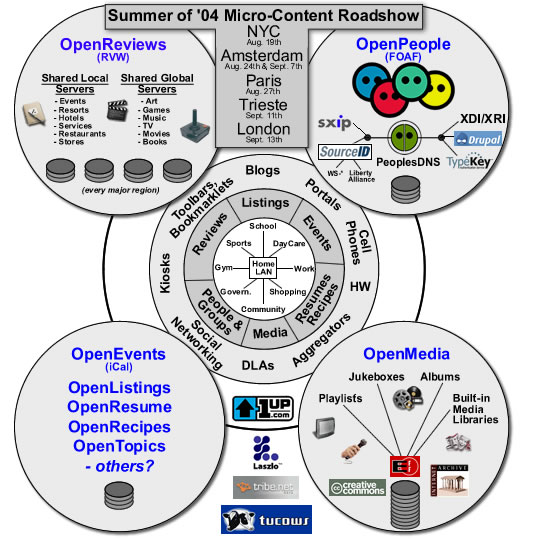|
This is my dynamic, frequently updated homepage. This is a NewsLog, also known as a WebLog or Blog.
Everything is evolving, so don't assume too much.
People to watch:
Adina Levin
Andrius Kulikauskas
Britt Blaser
Catherine Austin Fitts
Chris Corrigan
Clay Shirky
Dan Gillmor
Dave Pollard
David Allen
David Weinberger
Dewayne Mikkelson
Dina Mehta
Doc Searls
Elisabet Sahtouris
Elizabeth Lawley
Euan Semple
Florian Brody
Frank Patrick
Gen Kenai
George Dafermos
George Por
Graham Hancock
Greg Elin
Hazel Henderson
Heiner Benking
Inspector Lohman
Jean Houston
Jerry Michalski
Jim McGee
Jim Moore
John Abbe
John Perry Barlow
John Robb
Joi Ito
Jon Husband
Jon Lebkowsky
Jon Udell
Jonathan Peterson
Judith Meskill
Julian Elvé
Julie Solheim
Kevin Marks
Lawrence Lessig
Leif Smith
Letecia Layson
Lilia Efimova
Lisa Rein
Marc Canter
Mark Oeltjenbruns
Mark Pilgrim
Mark Woods
Martin Dugage
Martin Roell
Mary Forest
Matt Mower
Max Sandor
Michael Fagan
Mike Owens
Mikel Maron
Mitch Kapor
Mitch Ratcliffe
Nathalie dArbeloff
Netron
Noam Chomsky
Paul Hughes
Peter Kaminski
Phil Wolff
Philippe Beaudoin
Ray Ozzie
Raymond Powers
Rebecca Blood
Roger Eaton
Roland Tanglao
Ross Mayfield
Scott Lemon
Sebastian Fiedler
Sebastien Paquet
Skip Lancaster
Spike Hall
Steven Johnson
Stuart Henshall
Thomas Burg
Thomas Madsen-Mygdal
Thomas Nicholls
Timothy Wilken
Todd Suomela
Tom Atlee
Tom Munnecke
Tom Tomorrow
Ton Zijlstra
Lionel Bruel
Loic Le Meur
Nancy White
Mark Frazier
Merlin Silk
Robert Paterson
Colby Stuart
Nova Spivack
Dan Brickley
Ariane Kiss
Vanessa Miemis
Bernd Nurnberger
Sites to watch:
Edge
Junto
Absara
Rhizome
Nanodot
HeadMap
Openworld
FutureHi
Imaginify
Do No Harm
BoingBoing
Smart Mobs
Webcamorama
MetaFilter
NotThisBody
Disinfopedia
YES Magazine
Collective Web
WorldChanging
Disinformation
Escape Velocity
Space Collective
Friendly Favors
Emergent by Design
Independent Media
Global Ideas Bank
Forbidden Science
Greater Democracy
ThoughtsOnThinking
Disclosure Project
Explorers Foundation
Manufacturing Dissent
Collective Intelligence
Action without borders
Free Expression Network
Co-intelligence Institute
Electronic Frontier Foundation
French:
Emmanuelle
Manur
Elanceur
Loeil de Mouche
IokanaaN
Blog d'Or
Le Petit Calepin
GeeBlog
Absara
Guillaume Beuvelot
Ming Chau
Serge Levan
Jean Michel Billaut
C'est pas Mécanique

I live in Toulouse, France where the time now is:
01:01
Unique Readers:

Primarily
Public Domain
Everything I've written here is dedicated to the
Public Domain.

The quotes from other people's writings, and the pictures used might or might not be copyrighted, but are considered fair use. Thus, overall, this weblog could best be described as being:
Primarily Public Domain. |
Syndication:
 ![Validate my RSS feed [Valid RSS]](http://www.newciv.org/pic/valid-rss.png)
|
| Wednesday, August 25, 2004 |  |
|
|
|
 Felix Petersen just showed me his new baby plazes.com. Very cool. You get the idea by noticing the new widget in my left sidebar, which shows where I am. After one registers, one downloads a little launcher application which cleverly can keep track of approximately where one is, based on one's current IP number. One can then name that place, specifying its precise address if appropriate, and other people who come along later can annotate it. That's of course particularly cool for people who travel a lot, and if you end up somewhere where somebody else has been before. Like, think of a semi-public location like an open wi-fi network. You'll also be able to find known locations close to where you currently are. So, discovering a place to plug in your wi-fi laptop would certainly be an obvious use of this. But you can add all sorts of other things. Like maybe what good hotels or restaurants are close by. And it opens the door to many other possibilities based on location. Like finding people who're close by. It is still a new system with some minor quirks, but go give it a try if you're currently on some kind of Lan connection anywhere in the world. Felix Petersen just showed me his new baby plazes.com. Very cool. You get the idea by noticing the new widget in my left sidebar, which shows where I am. After one registers, one downloads a little launcher application which cleverly can keep track of approximately where one is, based on one's current IP number. One can then name that place, specifying its precise address if appropriate, and other people who come along later can annotate it. That's of course particularly cool for people who travel a lot, and if you end up somewhere where somebody else has been before. Like, think of a semi-public location like an open wi-fi network. You'll also be able to find known locations close to where you currently are. So, discovering a place to plug in your wi-fi laptop would certainly be an obvious use of this. But you can add all sorts of other things. Like maybe what good hotels or restaurants are close by. And it opens the door to many other possibilities based on location. Like finding people who're close by. It is still a new system with some minor quirks, but go give it a try if you're currently on some kind of Lan connection anywhere in the world.
[ Technology | 2004-08-25 14:19 | | PermaLink ] More >
|
|
| Tuesday, August 24, 2004 |  |
|
|
|
 From Jerry Michalski: From Jerry Michalski:Today at Tom Munnecke's GoodApples workshop in NYC, our lively moderator Izzy Gesell mentioned in passing the thirty-some fundamental plot lines. I couldn't help asking Google, which swiftly steered me to The Thirty-Six Dramatic Situations by Georges Polti, and The 36 Plots site by Loren Miller, which lists them all. And here they are: - Supplication - Persecutor, Suppliant, a Power in Authority
- Deliverance - Unfortunates, Threatener, Rescuer
- Revenge - Avenger, Criminal
- Vengeance by Family upon Family - Avenging Kinsman, Guilty Kinsman, Relative
- Pursuit - Fugitive from Punishment, Pursuer
- Victim of Cruelty or Misfortune - Unfortunates, Master or Unlucky Person
- Disaster - Vanquished Power, Victorious Power or Messenger
- Revolt - Tyrant, Conspirator(s)
- Daring Enterprise - Bold Leader, Goal, Adversary
- Abduction - Abductor, Abducted, Guardian
- Enigma - Interrogator, Seeker, Problem
- Obtaining - Two or more Opposing Parties, Object, maybe an Arbitrator
- Familial Hatred - Two Family Members who hate each other
- Familial Rivalry - Preferred Kinsman, Rejected Kinsman, Object
- Murderous Adultery - Two Adulterers, the Betrayed
- Madness - Madman, Victim
- Fatal Imprudence - Imprudent person, Victim or lost object
- Involuntary Crimes of Love - Lover, Beloved, Revealer
- Kinsman Kills Unrecognised Kinsman - Killer, Unrecognised Victim, Revealer
- Self Sacrifice for an Ideal - Hero, Ideal, Person or Thing Sacrificed
- Self Sacrifice for Kindred - Hero, Kinsman, Person or Thing Sacrificed
- All Sacrificed for Passion - Lover, Object of Passion, Person or Thing Sacrificed
- Sacrifice of Loved Ones - Hero, Beloved Victim, Need for Sacrifice
- Rivalry Between Superior and Inferior - Superior, Inferior, Object
- Adultery - Deceived Spouse, Two Adulterers
- Crimes of Love - Lover, Beloved, theme of Dissolution
- Discovery of Dishonor of a Loved One - Discoverer, Guilty One
- Obstacles to Love - Two Lovers, Obstacle
- An Enemy Loved - Beloved Enemy, Lover, Hater
- Ambition - An Ambitious Person, Coveted Thing, Adversary
- Conflict with a God - Mortal, Immortal
- Mistaken Jealousy - Jealous One, Object of Jealousy, Supposed Accomplice, Author of Mistake
- Faulty Judgment - Mistaken One, Victim of Mistake, Author of Mistake, Guilty Person
- Remorse - Culprit, Victim, Interrogator
- Recovery of a Lost One - Seeker, One Found
- Loss of Loved Ones - Kinsman Slain, Kinsman Witness, Executioner
That's fun. Well, not exactly fun for the characters in those plots, but presumably, like most good stories, things get worked out in the end. And good stories often involve some kind of big problem or wrong that, against significant odds, gets worked out or reversed or balanced out along the way. An endless number of novels and screen plays and games could me made from those models. One might even imagine that it would be possible to automatically create reasonably gripping stories from such a basis. Oh, takes other elements too of course. But life probably consists of more archetypes and archetypical scenarios than we'd usually be willing to admit.
I also get to think of the power of metaphors, and of a great book, which I unfortunately don't remember the details of right now, and I'm away from my library. As a therapeutic tool, stories and metaphors can be very powerful. See, we all have an innate sense of how good stories are supposed to progress. We can not always express it, but we recognize it when we're presented with it. There are many kinds of stories, but each one has a certain kind of fundamental structure. Now, think of somebody who has a personal problem that seems unsolvable to them, and which is resistant to most direct attempts of helping them change it. Imagine that a wise and resourceful observer recognizes the structure of their problem, and presents them with a story. A story which happens to have the very same fundamental structure as their problem, but very different content, and a story which happens to get resolved in the end, like good stories do. If the person can get sufficiently involved in that story, following along with it, noticing that the difficult situations get resolved, something magical can happen. Without consciously noticing what happened, they might suddenly find that from the depths of their subconscious they suddenly also have the resources for resolving their own particular situation. The structure of a story from a very different setting might transfer to their particular setting, despite any "good" reason that it shouldn't. There's just something compelling about stories that get finished.
Knowing the archetypical structure of many fundamental human scenarios can thus be a tool for much more than just writing entertaining stories. I'm sure there are many more than 36, though. And some of them are more fun.
[ Patterns | 2004-08-24 22:34 | | PermaLink ] More >
|
|
|
|
 In Australia like many other places, prudish politicians have decided that they know what's best for people and are trying in various ways to outlaw pornography, or to install restrictive mechanisms to 'protect the children'. The trouble is of course that there's no particular factual or empirical basis for such policies. Its just what they somehow think is Right. Or, we could well say that the people who are proposing them have in one way or another developed their own perverted attitudes to sexuality and to children, which they're trying to make right by enforcing them on everybody else. It's an old story. You know, the awful sneaking suspicion that somebody somewhere is having a good time, and it's got to be stopped. In Australia like many other places, prudish politicians have decided that they know what's best for people and are trying in various ways to outlaw pornography, or to install restrictive mechanisms to 'protect the children'. The trouble is of course that there's no particular factual or empirical basis for such policies. Its just what they somehow think is Right. Or, we could well say that the people who are proposing them have in one way or another developed their own perverted attitudes to sexuality and to children, which they're trying to make right by enforcing them on everybody else. It's an old story. You know, the awful sneaking suspicion that somebody somewhere is having a good time, and it's got to be stopped.
Anyway, much to their displeasure, apparently some Austrialian researchers have studied a lot of habitual porn users and found that they typically are more relaxed, less judgmental and have better marriages and families. And what about children? Asked whether such results meant pornography was good for children, Dr McKee said: "I think you come there to an issue we can't answer - should children who are 16-years-old be allowed to be sexual?" And who says 16-year olds are children? Nature certainly seems to have something else in mind. But a lot of governments try to stop it. In the U.S. you're in various important ways considered a child until you're 21. Big mistake to keep treating people as irresponsible idiots in those years where the most urgent and natural thing they need to learn is the opposite. Big mistake to think one can pretend sexuality out of existence with oppressive laws. Anyway, most kids I know are the result of people having had sex, and having had a very good time in the course of it. Trying to then enforce that sexuality or images of sexuality should be kept out of families at all costs sounds a bit off-the-wall. Sort of anti-family or something.
[ Politics | 2004-08-24 23:23 | | PermaLink ] More >
|
|
|
|
 Stop Dating Liberals!
Are you tired of arguing on your date with a liberals?
Do you get sick of hearing your boyfriend or girlfriend bash President Bush?
Now there is hope!
Join the ConservativeMatch.com community and find thousands of conservatives singles just like you.
Don't wait! Join Free Today! I thought it was a joke at first, but no, ConservativeMatch is real. So, if you the range of your political horizon is Traditionalist, Very Conservative, Conservative or Moderate, then you might find your love here. It will also help matters greatly if none of you are very bright. On second thought, I'm not sure if it is wise to help you procreate, so maybe you should stay home and study the bible and watch Fox News instead.
[ Politics | 2004-08-24 23:56 | | PermaLink ] More >
|
|
| Friday, August 20, 2004 |  |
|
|
|
 OK, it is a lot easier to criticise other people's predictions than to make one's own. But it might get one going on thinking of better ones. I was just reading an article, It’s 2014, and life is the same. Only better by Canadian science fiction writer Robert J. Sawyer. And, well, as his title honestly says, he's describing life the same, just a little better. And it struck me how much it sounded like essays I would write about the future when I was around 11. That's about 34 years ago. He writes better than I did, but then again my predictions were about the year 2000, which was considered "The Future" back then. OK, it is a lot easier to criticise other people's predictions than to make one's own. But it might get one going on thinking of better ones. I was just reading an article, It’s 2014, and life is the same. Only better by Canadian science fiction writer Robert J. Sawyer. And, well, as his title honestly says, he's describing life the same, just a little better. And it struck me how much it sounded like essays I would write about the future when I was around 11. That's about 34 years ago. He writes better than I did, but then again my predictions were about the year 2000, which was considered "The Future" back then.
I thought that in the year 2000 we'd be able to work at home if we wanted, and we'd be able to shop in stores through video screens at home, and that we'd be able to get our own personalized newspaper printed out every morning, with exactly the kind of news we'd prefer. I'd be able to speak commands to machines around me, and robots in my kitchen could make me breakfast on their own, and clean the house. We'd have self-driving cars. Or flying cars if we were going into the country. We'd be able to easily travel up to a space station, or to the Moon or Mars.
The first part of my predictions were quite spot on. That's called the Internet. The rest is, shockingly, hardly any closer than in 1970. The space program was more active and vibrant back then. The test projects for self-driving cars look about the same as they did back then. You still can't buy a flying car.
Cars and houses look about the same. Oh, they have different styling, but nothing fundamentally different at all. Air bags? They could have made a balloon be blown up really quickly back then too, if anybody had asked for it.
The stuff that has changed unbelivably much is the virtual. The stuff we can do inside computers. Even though we're still strangely conservative about what we make them do. We manage to make computers 10,000 faster, and still word processing seems no faster than way back when. But the greater power leverages other things to happen. Like, the way we connect things together and how we network information - that suddenly puts us on a different plane.
Notice that the features of my old prediction that require AI didn't happen. Because, surprisingly to some, AI didn't really happen. I can buy a vacuum cleaner that will move around on the floor and clean by itself, fairly well, if you have certain types of flooer surfaces, and not too difficult things in its way. One could probably have made that mechanically in 1970 or 1950, if it were a priority, and not much worse. Today I can speak to a computer and it might type my words pretty well, if I've trained it, but it still doesn't understand what I say, even vaguely. No, it wasn't so much the AI that advanced. It was the ability to calculate much faster, and to connect lots of things together, and to make various kinds of virtual realities possible.
Interestingly, the material technologies that are most promising, and that really might give us a profoundly, drastically different future are all in the realm of the virtual. Making matter virtual. Nano-tech, quantum physics, genetics. Really small stuff that, if we find out how to program it, suddenly allows us to rebuild reality in a drastically different way.
Will we have done so by 2014? Will it really just be that your toilet analyzes your urine and tells you you've got a cold? And that your kitchen cooks a low-carb breakfast for you by itself? I hope not, although those might possibly be good things.
Predictions of daily life in the future easily end up sounding sort of sugar coated and problem free. So, if one 35 years ago predicted that I today could have a custom newspaper on a screen and shop in stores and talk with people in other countries on a video phone, it would be presented as if it somehow made life leisurely and problem-free. But life is no less stressful today, and my life isn't suddenly leisurely because I have those things. It is kind of like an architect's mock-up of a new building, with stylized people who stroll about between green trees and pathways, with conveniently located service facilities. But when it is actually built, it is just some mall, and it is filled with real people who're stressed and on their way somewhere. Usually never looks as leisurely and perfect as in the vision. At least not unless it stays as a virtual simulation of some kind.
But, again, in 10 years, will anything have managed to REALLY change how we live. The Internet changed it more in a couple of years than anything else I can think of in the past 100 years. It was a disruptive change. Most forecasters have a hard time guessing which disruptive changes will come along. Although we have a few very likely ones in our focus. Nano, genetics. And some people center it all around an expected major AI breakthrough. In part because that might potentially solve some of the huge dangers inherent in some of the other things.
It is entirely possible that somebody might invent cheap universal nano-tech within the next 10 years. I mean something that can construct whatever you imagine, or rather whatever you can program, or download the blueprint for, as long as the needed atoms are around. Like an inkjet printer that spits out atoms and print objects. Suddenly objects are virtual, and the game would totally change. How we live would change thoroughly and drastically within just a few months.
The future is so open now, with such a range of possibilies, that it becomes almost laughable to predict a world in 10 years that just has more, and a little cooler stuff, that is essentially the same. But many of the bold predictions from 35 years ago didn't happen at all, and we just got more of the same. So of course we might have just more of the same in 10 years. Maybe a better electronic voting system for choosing between your favorite Republican presidential candidate and your favorite Democratic candidate. Yawn, gasp! The FCC releases some more spectrum, and technology gets better, so you can have 100Mbits to your cellphone, and watch movies in 3D in the bus, which will be charged to your credit card, and which then self-destructs in 5 hours. All cars would have nagivation systems, and maybe collision detection systems. Just enough stuff every year to make you keep buying. The US army would have robotic bombers that more efficiently could kill more people in foreign places, without even having to send any people there. Microsoft would've come out with some updated version of the paperclip, which can make more wide-spanning stupid assumptions about everything you're trying to do, and correct even more things that didn't need to be corrected.
I'd be leaning towards hoping for some disruptive and more pervasive change. Something so disruptive that it kills most of those factors that would otherwise ensure that we'd just have more of the same. Something that destroys the current economic power structure. In a good way, in making it instantly obsolete and replaced with something better. I hope for such things because, despite increasingly rapid change in some areas, the future is at risk of being boring and stagnant.
I also expect disruptive change for the reason that progress in many areas is held back by backwards economics. The future that was expected from the year 2000 a few decades before was quite reasonable and logical. It would have happened if it weren't because there weren't any terribly profitable reason for investing capital in making it so. What was profitable was to give us apparently a little more of the same every year, in a new model, with new features, but nothing that really changed things. Weren't any profit in giving us space stations. Certainly weren't any in even attempting to feed us all, or even get us clean drinking water. Weren't any profit in taking good care of our environment.
Collectively I think we'll discover that we've been cheated, and that we're living in a falsely retarded world that doesn't have to be that way at all. Some forces are going to clash. Disruptive paradigm shifts sometimes come about because of pent-up problems that weren't solved, and pent-up solutions that existed, but weren't applied. At some point it breaks through, and things have to change rather quickly, because they failed to change gradually.
Our greatest leverage is in the areas that aren't artificially retarded, because nobody figured out yet how to do so, because they didn't start trying before it was too late. Our ability to network ourselves with each other and with information, electronically, and the likelihood we'll be free to do that faster and better. It is a way we can create something very different, which might at first be somewhat invisible. Not a different kind of car or microwave for me and my family. Not just something a few people are consuming. Something millions of people are doing together. A whole new collective organism. Which needs to start dealing better with meaning. And which, once it gets smarter, or we get smarter through it, needs to feed back to our material world and make it smarter and more fun and livable, on our own collective terms.
Being creatures who tend to live in certain mental grooves, when asked to predict the future, we usually extrapolate more of the same. Which might be right. But we usually forget to predict the changed behavior that comes about when certain things go through certain thresholds. For many years we had telephones. And for years one could very expensively get a portable one. We didn't expect the changed behavior patterns that would come about by a majority of people in the world having a cheap portable phone in their pocket at all times. One could have predicted that electronic networks would have allowed us to send electronic mail to each other, and it would be more efficient than paper mail. But the social aspects of what happened when enough of us were online would have been hard to predict. We can predict many things one could do if one had self-replicating nano-tech. But is hard to predict what will change and what will happen once those things are accepted and widespread, and we use that as a springboard for something else. We might see the next hilltop, but have a hard time seeing the valleys and bigger hills beyond it. There are event horizons beyond which we can't see, no matter the strength of our glasses, so we have to imagine.
I predict that within the next 10 years there will be at least one, but probably several disruptive changes that are so surprising and pervasive that life will be very different from how we know it or how we project it to be. There won't be a Ford Taurus 2014 or an NBC Nightline News or an aisle in the supermarket with fruit juice with 10% more real fruit. Other than in a retro simulation for people who like them for atmosphere. I don't know. There is no future, really. There's just right now, and there still will be just now in 10 years. Thinking about the future as separate from the now is just one of those mind games we play with ourselves, when we are bored or inspired, or fearful or hopeful. A mind game that sometimes helps us knowing which fork in the road to take right now, by examining which of the imagined journeys would suit us best.
[ Thoughts | 2004-08-20 23:59 | | PermaLink ] More >
|
|
| Thursday, August 19, 2004 |  |
|
|
|
Via several places, like Canuckflack, this chart:

which is from a report Online Communities in Business: Past Progress, Future Directions. Which is based on a survey about, obviously, the use of online communities in business. And which has findings like this:* Participation in online communities, networks, and teams is growing (82%)
* Technologies for online groups are continuing to improve (79%)
* Retention of participants is not a significant problem (63%)
Despite these positive signs, some familiar problems persist:
* Most organizations can’t measure return on investment (72%)
* Many people still don’t understand what online community is (72%)
* The discipline of creating and managing communities is poorly defined (59%) Sounds about right, even if not earth shattering. And the chart is interesting, showing the evolution of what we consider an online community. A virtual community is an idea that was most cool a few years ago, but which has merely morphed into somewhat different forms. Btw, I wouldn't place it in 92-93, but more like 95-96, and Amazon's and ebay's time are a little later too, I'd say, even if they maybe existed before.
[ Information | 2004-08-19 01:20 | | PermaLink ] More >
|
|
|
|
 A new kind of currency? RPOW. OK, it is a bit technical: A new kind of currency? RPOW. OK, it is a bit technical:The RPOW system provides for proof of work (POW) tokens to be reused. A POW token is something that takes a relatively long time to compute but which can be checked quickly. RPOW uses hashcash, which are values whose SHA-1 hashes have many high bits of zeros.
Normally POW tokens can't be reused because that would allow them to be double-spent. But RPOW allows for a limited form of reuse: sequential reuse. This lets a POW token be used once, then exchanged for a new one, which can again be used once, then once more exchanged, etc. This approach makes POW tokens more practical for many purposes and allows the effective cost of a POW token to be raised while still allowing systems to use them effectively. One of the uses of that is for spam prevention. If a computer that sends an e-mail has to do a very complicated ("costly", at least in terms of time) operation, and it can be verified that it really happened, it would make it much harder for people who'd want to spew out hundreds of thousand messages an hour to people who don't want them. But for regular e-mail senders, it might not be an issue. And if one can reuse those things, it might be ok if they're relatively harder to come by in the first place, making it even harder for spammers.
OK, when I read the title first, I thought this was a way of certifying that some people did some valuable work for some other people, and that this could be passed around as a currency. That's not what it is. But one could indeeed imagine that this kind of thing could form the basis for something that could be an economy applied to other things. You know, if a penny costs more to manufacture than the value it represents, there's no point in forging one, even if you could. And a hundred billion pennies do add up to real money, which can be reused many times. I suppose this kind of money needs to be adjusted, not for regular inflation, but for Moores Law.
[ Information | 2004-08-19 01:51 | 0 comments | PermaLink ]
|
|
| Tuesday, August 17, 2004 |  |
|
|
|
 "Microcontent" seems to be one of the buzzwords now. So, what is that, really? "Microcontent" seems to be one of the buzzwords now. So, what is that, really?
Jakob Nielsen, interface guru, used it (first?) in 1998 about stuff like titles, headlines and subject lines. The idea being that first you might see just a clickable title, or a subject line of an e-mail, that you then might or might not decide to open. So, that title needs to be representative of the full thing, or you might not click it, or you'll be disappointed when you do. Microcontent (the title) needs to match macrocontent (the page, e-mail, article).
Now, that doesn't quite seem to be how "microcontent" is used nowadays. OK, on to 2002, Anil Dash says this, talking about a client for microcontent: Microcontent is information published in short form, with its length dictated by the constraint of a single main topic and by the physical and technical limitations of the software and devices that we use to view digital content today. We've discovered in the last few years that navigating the web in meme-sized chunks is the natural idiom of the Internet. So it's time to create a tool that's designed for the job of viewing, managing, and publishing microcontent. This tool is the microcontent client. For the purposes of this application, we're not talking about microcontent in the strict Jakob Nielsen definition that's now a few years old, which focused on making documents easy to skim.
Today, microcontent is being used as a more general term indicating content that conveys one primary idea or concept, is accessible through a single definitive URL or permalink, and is appropriately written and formatted for presentation in email clients, web browsers, or on handheld devices as needed. A day's weather forcast, the arrival and departure times for an airplane flight, an abstract from a long publication, or a single instant message can all be examples of microcontent. Oh, and an absolutely excellent article it is. It calls for the building of a client, a program that will allow us to consume and create microcontent easily. Not just aggregate it, but allow us to use it in meaningful ways. I.e. seeing the information how we want to see it, without having to put up with different sites' different user interface quirks. Good examples he gives at the time is Sherlock or Watson on Macs. You can browse pictures, movies, flight schedules, ebay auctions and more, all from the same interface, and without having to go to the sites they actually come from. But we're still not quite talking open standards for all that.
What is needed is the semantic web, of course. Where all content has a uniform format, and is flagged with pieces of meaning that can be accessed and collected by machines. Isn't there yet. Many smart people are playing with pieces of it, like Jon Udell, or Sam Ruby. Or, look at Syncato. All stuff mostly for hardcore techies at this point. But the target is of course to eventually let regular people easily do what they find meaningful with any data that's available on the net.
[ Programming | 2004-08-17 12:53 | | PermaLink ] More >
|
|
| Monday, August 16, 2004 |  |
|
|
|
I'm not getting much posted here right now. I'm in a streak where I get a lot of programming done. Working on my OrgSpace system. Integrated a bunch of my modules a good deal better, in a unified system. And now I'm reviving a content management system I did some years ago. Will be pretty cool when I'm done. It isn't great for my sanity to work in this kind of mode, where I just work on the same thing for all day, but I do get things done. And right now all the rest of my family is out of town, so I've got peace and quiet for once. Well, I'll follow them to Denmark in a few days, but I'll get the most out of it when they're not here.
[ Diary | 2004-08-16 14:33 | | PermaLink ] More >
|
|
|
|
I occasionally have the problem of trying to figure out which is the most authoritative source of some type of data, and that usually isn't easy, and not much automation is available.
So, for example, I'm adding a list of languages to a program. I'd like it to be a standard list, using standard codes. OK, I quickly find out that there is an international standard for that, ISO 639, which provides two or three-letter codes. And the authoritative site on it has a list, in an HTML table. Which, after a half hour of work I got imported into a database. It was obviously written by a human, with the cells having a bunch of different inconsistent formats. But why isn't this in a consistent XML format I can pick up automatically? What if this list changes, like when next week they decide there are really a couple of more languages that need to be on the list. It is doubtful I'll ever get around to importing it again the hard way, unless somebody has a problem. So sooner or later my data will be out of whack.
And then I need a thing for selecting timezones, so I can show time in people's local format. Where's the authority for that? I can find lots of places that list the different time zones. But no easy way of knowing when they have daylight savings time. The map of who uses what system across the world is surprisingly complex. Just see Canada. But the whole thing would really be a few kilobytes of data. I just want the correct data. I can find companies selling that, for $399 per year, but that's kind of silly. .... ah, a little more research shows that the Olson TZ database built into all Unix and Linux systems is a fine solution. It isn't authoritative, but it seems to be good, and gets updated once in a while, and it is already there. I kind of knew that, I had just forgotten. I'll use that. But, really, there should be one authoritative webservice somewhere I could just call. Manned by one employee in the UN or something, who'll call somebody in each region a couple of times per year and hear if they've changed their system, and who updates the database accordingly.
There are a lot of things one could do if more data were easily available as web services in authoriative normalized versions. Population, environment, geographical, financial data. If it were all available in standard ways, I could make my own analysis of what seems to be going on in the world. As it is right now, one has to put up with third hand questionable data, and it takes quite some financing to get somebody to normalize the data so one can do things with it.
[ Programming | 2004-08-16 15:32 | | PermaLink ] More >
|
|
| Thursday, August 12, 2004 |  |
|
|
|
 It is so easy to forget how magical and amazing life is. Not just my life, but the life in nature. You drop a seed in the ground, water it a bit, and the sun shines, and this seed strangely knows how to turn into a big plant, and to reproduce and make more, ad infinitum. I kind of wouldn't believe it if it wasn't so normal. And, ok, I'm not really much into gardening, but I do go out and water every day, which I can just about handle. And I can't miss all the stuff that comes up all by itself from what was just a piece of soil. OK, we dropped a few seeds and little plants in there, but the weeds are just as interesting. It is so easy to forget how magical and amazing life is. Not just my life, but the life in nature. You drop a seed in the ground, water it a bit, and the sun shines, and this seed strangely knows how to turn into a big plant, and to reproduce and make more, ad infinitum. I kind of wouldn't believe it if it wasn't so normal. And, ok, I'm not really much into gardening, but I do go out and water every day, which I can just about handle. And I can't miss all the stuff that comes up all by itself from what was just a piece of soil. OK, we dropped a few seeds and little plants in there, but the weeds are just as interesting.
People who're into technology often have little regard for nature. Messy, primitive, dirty stuff, which we think we can do much better. Where really we have little clue. Most of our technology is horribly primitive compared with the technology of nature. We are incapable of making anything like a seed. We can dream about it, in the form of nanotechnology, but no real results. A little unit, weighing a few milligrams, and you drop it into some random soil, and on its own power it extracts building materials from the surroundings, and reproduces cells, and builds a rather fancy construction with billions of parts and a whole infrastructure. Which is then solar powered, in addition to the water and minerals it keeps extracting. All at room temperature or worse. And not only that, but it is self-replicating, and will produce new seeds that do the same.
The best competition we can come up with is to mess with these things, and poke inside them, and see if something different comes out. Kind of typical for how our technologies work. We know how to poke around and learn to exploit something, by seeing what happens if we poke it different ways. You know, like psychiatry by cutting off different parts of the brain and seeing what happens. But we're very ignorant on how to actually make any of the stuff we're messing with. We haven't succeeded in making a single cell, despite having taken many apart to see what they consisted of. We don't really get it yet. Life, on many levels.
[ Thoughts | 2004-08-12 08:38 | | PermaLink ] More >
|
|
| Sunday, August 8, 2004 |  |
|
|
|
 Benoît Mandelbrot is the guy who "invented" fractals. I.e. the mathematical formulas that made them visible in pretty patterns. Benoît Mandelbrot is the guy who "invented" fractals. I.e. the mathematical formulas that made them visible in pretty patterns.
He's obviously a smart guy, and now he wrote a book about patterns in financial markets, and part of it is quoted as an article in Wired. Now, when I first saw the link to it, I got excited. Actually applying the best possible math to really understand how to economy works - that would be a splendid idea. Maybe we can calculate how we maximize that everybody gets what they need, and creativity and good work is encouraged the most. That's just a matter of optimizing how the game is played. Well, I say "just", but I don't know how to do it. But with a study of patterns, and simulations, and lots of math, that ought to be possible.
Turns out it isn't about that at all. Seems he's rather appealing to the wizards of wall street to do better simulations of the stock market. And he's appealing to "regulators" to regulate global bank reserves. Oh, I'm sure he knows what he's talking about ...within a certain scope. I just think the real story is way outside that scope. I don't think the Bank for International Settlements have in mind suddenly being regulated. Their little corner of Basel have by treaties been beyond the law and scrutiny of any government for a long time, and I don't see why they would change that. And I have no doubt that they already are spending many billions of dollars each year on computer simulations. And, no, I don't think it is just of the stock market and the employment rates. But what do I know?
Anyway, he does say some quotable things:A well-managed corporation devotes some portion of its research and development budget to basic research, in fields of science that underlie its main business. Isn't understanding the market as important to the economy as understanding solid-state physics is to IBM? If we can map the human genome, why can't we map how a man loses his livelihood? If millions can contribute a few cycles of their PCs to the search for a signal from outer space, why can't they join a coordinated search for patterns in financial markets? Well, yeah, why not. Or rather, why can't we run better simulations of our overall society? Or, rather, why can't WE do that, rather than just the supercomputers of some central central bank who isn't sharing what they find?
The first thing we'd notice would probably be that there's a curious absence of know-how on how to do that, and I lot of experts who'll say it is impossible or uncessary. All the more reason for somebody to do it.
OK, it isn't easy, as human factors play a big part. But we really ought to be able to evaluate alternative scenarios for how we structure our society economically. With an eye towards maximizing the lasting benefit for 6.4 billion people, not to mention the planet we live on. As opposed to just scenarios to help capital holders hold on to their capital.
[ Patterns | 2004-08-08 20:25 | | PermaLink ] More >
|
|
| Friday, August 6, 2004 |  |
|
|
|
Jon Udell quoting Alan Durning:Play back the last 10,000 years sped up, so that a millenium passes by every minute. For more than seven minutes, the screen displays what looks like a still photograph -- the blue planet Earth, its lands swathed in a mantle of trees. After seven and a half minutes, there's a tiny clearing of forest around Athens. This is the flowering of classical Greece. Little else changes. At nine minutes -- 1,000 years ago -- the forest gets thinner in parts of Europe, Central America, China and India. Twelve seconds from the end, two centuries ago, the thinning spreads a little farther in Europe and China. Six seconds from the end, eastern North America is deforested. This is the Industrial Revolution. And of course, in the last 3 seconds things get to look really alarming.
 Anyway, Jon talks about David Rumsey, a philanthropist who collects historical maps, scans them at high resolution, and makes them freely viewable on the Internet. He gave a speech at an open source conference. He says: Anyway, Jon talks about David Rumsey, a philanthropist who collects historical maps, scans them at high resolution, and makes them freely viewable on the Internet. He gave a speech at an open source conference. He says:I thought about donating it to a university, but their libraries focus on preservation, they'd have put my collection in a vault and there would have been no access. Along comes the Internet, and I found we could do even more with the digital content than with the originals. We serve over 7000 visitors a day. A typical map library will serve 200 visitors a year. Historical maps, who cares about that? Well, he's apparently put a lot of work into providing some very impressive high tech tools for exploring them. One can sequence maps for different time periods, to see how things change. One can overlay maps on each each other, including overlaying old maps on modern 3D elevation maps, and you can then take a virtual flythru through an old map.
Maps are a good thing when they help us see the world and our history more clearly. Which they do much better in online interactive form than as paper in the basement of a university.
[ Knowledge | 2004-08-06 09:42 | | PermaLink ] More >
|
|
|
|
Marc Canter is going on a road trip. Well, I probably wouldn't have mentioned it if it wasn't for the t-shirt. A cool mind-map kind of thing on all things open and connected on the net, which Marc is a champion for.

Hey, I love it. Specific info here.
[ Information | 2004-08-06 09:45 | | PermaLink ] More >
|
|
|
|
I might have accidentally looked at it once before, but didn't pay any attention before this article on CNN. Craigslist is a simple and funky looking site with classified adds. Started off in 1995 by one guy, Craig, sending out a daily e-mail with a jumbled collection of different items offered or sought. And then it gradually grew to something more, and that site, and a more organized, but still funky looking collection of stuff. OK, as I said, I didn't really pay any attention to craigslist, but my daughter, sitting next to me right now instantly recognizes the page and says:"Oh, craigslist? You can find everything on craigslist. Everything." And she goes on with a long list of things she's found there, and that other people she knows have found. Dates, photographers, free computers, etc.
Most listings are free on craigslist. Sofar only some of the job ads have been charged for. But that article mentions that they're going to start charging for all the job ads. Which the writer quickly guestimates to be a $25 million a year business. And there are 14 people working there. And they're thinking about an IPO. And they have one billion pageviews per month.
I mention it as a good small business success story. With a "why didn't I think of that" quality. Hey, I used to send out regular mailings in 1995 with assorted items that people offered or were looking for. And I could have made that site with both hands tied on my back. But Craig did, and stuck with it, so hats off to him.
[ Information | 2004-08-06 09:47 | | PermaLink ] More >
|
|
| Tuesday, August 3, 2004 |  |
|
|
|
 Slashdot links to an article from 2002, called "August 2009: How Google beat Amazon and Ebay to the Semantic Web". A piece of fiction. But a surprisingly well done picture of a possible scenario for the web. Yeah, if Google played their cards well, they could pretty much control the earth in 5 years. Although control isn't the right term. Slashdot links to an article from 2002, called "August 2009: How Google beat Amazon and Ebay to the Semantic Web". A piece of fiction. But a surprisingly well done picture of a possible scenario for the web. Yeah, if Google played their cards well, they could pretty much control the earth in 5 years. Although control isn't the right term.
Lots of people talk about the Semantic Web. Basically it is that instead of just putting up free-form text, everything would somehow be marked up as to what it is. And various kinds of programs might them come along and extract some more meaning out of what is there. And potentially the whole web might get connected together in a much more dynamic and meaningful way. There are very smart people (I hope) working on standards that would make it possible. However, it is so complicated that most just ordinarily smart people don't quite get it. And so far there's nothing particular you can do with it.
Anyway, that article there actually does a fine job at explaining what it potentially might mean for regular people. And it outlines the quite real possibilitiy that somebody, like Google, might suddenly get together some tools that actually make it work on a large scale. And they might do it so well that it revolutionizes the way we do a whole lot of things, like how we buy and sell products.
The key is connected information, of course. If when you want to buy something, you can access all possible vendors of the product, and you know where they are, and you automatically can link it up with the satisfaction level of their customers, and any other factors you want to throw in, and you can get the list sorted any which way you want - you'd of course be stupid to just buy based on the first ad you run into that looks sort of interesting.
[ Information | 2004-08-03 11:33 | | PermaLink ] More >
|
|
<< Newer stories Page: 1 ... 30 31 32 33 34 ... 97 Older stories >> |
|

This is a collage of things that catch my eye, things that need to be said, and stuff I really care about
TRUTH
BEAUTY
FREEDOM
LOVE
TECHNOLOGY
|
| Mon | Tue | Wed | Thu | Fri | Sat | Sun |
|---|
|
|
|
|
|
|
1 |
| 2 |
3 |
4 |
5 |
6 |
7 |
8 |
| 9 |
10 |
11 |
12 |
13 |
14 |
15 |
| 16 |
17 |
18 |
19 |
20 |
21 |
22 |
| 23 |
24 |
25 |
26 |
27 |
28 |
|
|




